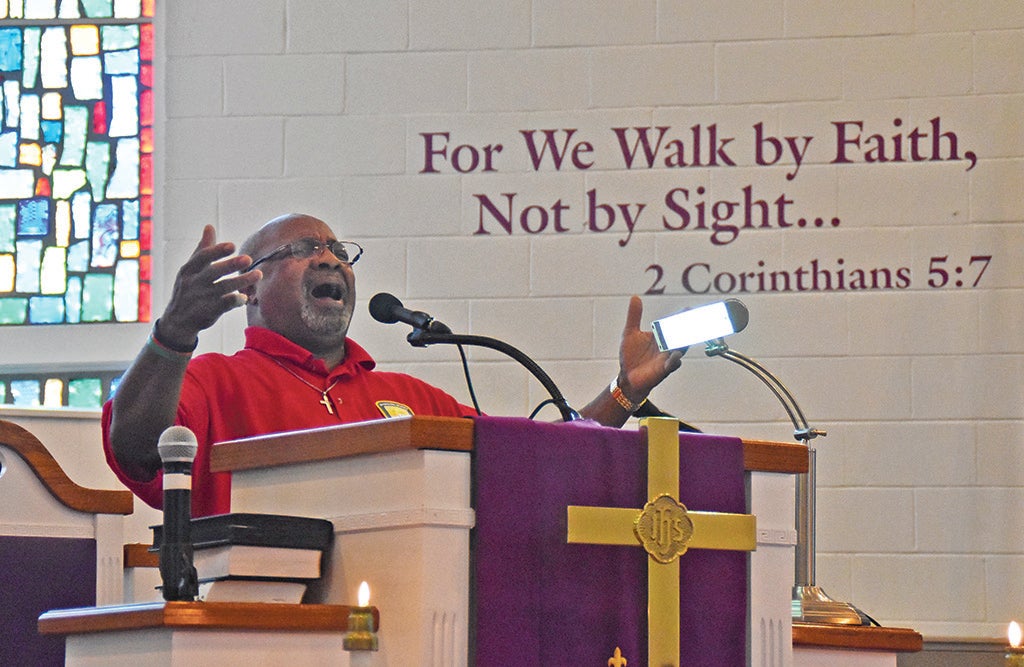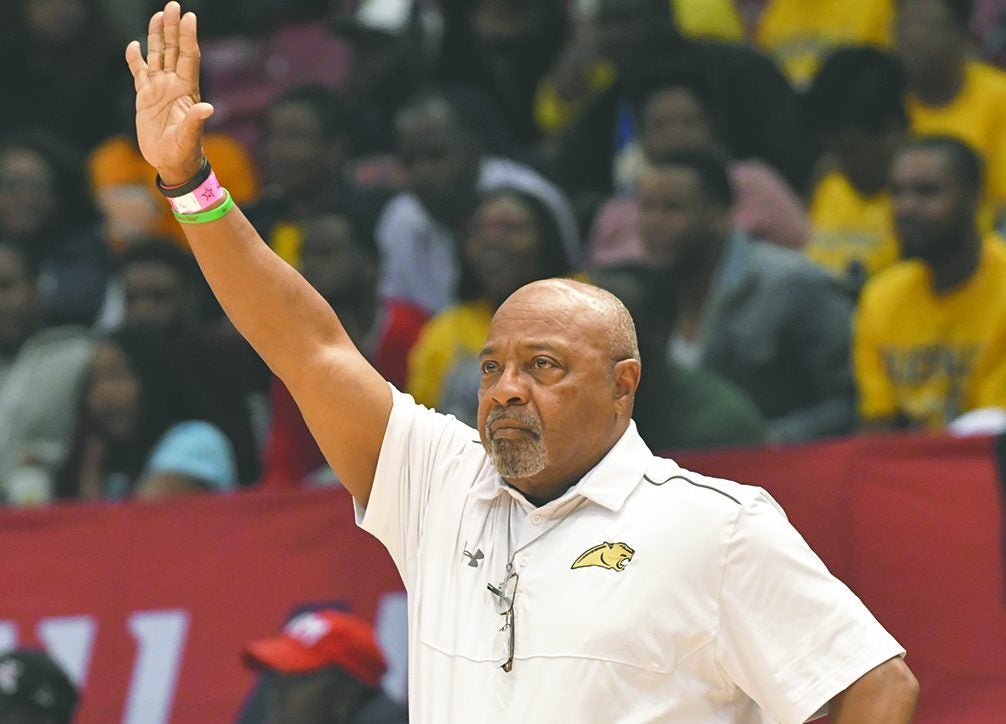Walking by faith
Published 5:59 pm Thursday, March 1, 2018
TUSKEGEE — One day before the Class 2A boys basketball state semifinal, Rev. Richard Carter stands behind the chest-high wooden pulpit at Washington Chapel A.M.E. Church.
Placed along a two-lane country road, it is a humble brick building that features stained glass, tall ceilings and double doors with cross-shaped windows.
Behind the entrance is an atrium with a floor-to-ceiling column in the middle. A bulletin board disguised as a photo collage, titled “Christmas with the Carters,” rests against it.
Members of Washington Chapel’s congregation appear with their pastor in nearly every frame. He is smiling in all of them.
On this drizzly Sunday morning, Carter already has led his church in the call to worship, in the reciting of Hymn 571 and in the singing of “Happy Birthday” to a member in attendance.
Now, his hands are gripping the pulpit as he prepares to deliver his sermon. He will speak on Luke 18:35-43, a passage he reads aloud from a King James Bible that fits in the palm of his hand. The section of Scripture details the account of a blind beggar whom Jesus heals.
Carter, sporting an untucked red golf shirt and a gold cross necklace, removes his glasses after completing the reading. Then, he grabs a cordless microphone.
The first key point that Carter conveys regards faith, which he explains is a matter of seeing and believing, even when you can’t see. This topic serves as the thesis of his sermon.
But it also could serve as the thesis of Carter’s life story.
The Lanett High School basketball coach has remained steadfast to the Lord since entering the coaching profession nearly 50 years ago. Even when his lifelong dream of winning a state championship appeared an unattainable reality, he never lost faith.
Thirteen times he took teams to the state final four in Alabama and Georgia. Thirteen times he fell short of the ultimate goal. In his 14th attempt, Carter led Lanett to the state crown in 2016, at age 68.
Now, his Panthers are on the brink of a third consecutive title. On Friday, the Lanett boys will face St. Luke’s Episcopal in Birmingham for the 2A state championship game.
Only nine times in the 97-year history of the Alabama High School Athletic Association has a boys basketball team won state three years in a row.
“I thank God for giving me the strength and the wherewithal to get here; I really do,” Carter said. “He’s been good to me over these years, and I know He has.”
Landing at Lanett
Carter is in front of another audience a little more than 24 hours after delivering his last sermon. But now, he is in Birmingham at Legacy Arena, a venue far more cavernous than Washington Chapel.
The Panthers are playing in the state semifinals against an Aliceville team that last appeared in the final four more than two decades ago. Lanett has made it to this stage in six of the past eight seasons.
The Panthers’ comfort becomes apparent as the game wears on.
After taking an early lead, they withstand a post-halftime surge, shunning panic and embracing calm. Aliceville twice cuts the lead to three points, but Lanett answers each time.
Carter paces the sideline with folded arms.
He watches as seasoned veterans Anquaevious Pollard, Emanuel Littles and Ty Truitt focus the team down the stretch. All three finish with double-digit point totals to help Lanett punch its ticket to the final.
In the postgame press conference, the seniors sit on either side of their coach. He praises their leadership, discipline, dedication and desire.
He also acknowledges the persistence of the other team and gives glory to God.
“I just want to thank the good Lord for bringing us to this point,” Carter said. “I’ve said in the past it’s hard to win one, and then come back and win a second last year, and then turn around this year and have an opportunity to win three in a row. Hey, it’s all about Him, not us.”
It is not uncommon for coaches to mention their faith under similar circumstances. But often their words come across as a perfunctory gesture, inspired more by obligation than authenticity.
Carter authors his words with conviction.
That’s one reason Lanett High athletics director Clifford Story courted him for the school’s head basketball position seven years ago.
Story played for Carter’s brother, Charles, at LaFayette High School in the 1990s. As such, he was familiar with Richard Carter’s reputation.
Story knew he wanted someone guiding the Panthers who possessed character, embodied spirituality and garnered respect.
He also wanted a coach who could elevate the program to another level. The school had never won a state basketball title when Carter arrived in 2011, despite a number of close calls.
“One thing about him is he’s consistent, and the kids know what they’re going to get day in and day out when it comes to preparation,” Story said. “He’s just one of those people; everybody needs Coach Carter around. That’s why I’m praying and hoping as long as I’m here, he’s here.”
Originally, Carter did not intend to take the job.
When he stepped away from the Greenville High (Ga.) boys program after the 2010-11 season, he thought he was walking away from the coaching profession.
He would have more time to focus on pastoring and taking care of his late wife, Cynthia Lorraine, who was recovering from a stroke and battling multiple myeloma, a form of bone cancer.
But Carter, who began coaching in the 1960s at Bullock County High School, couldn’t resist Story’s offer.
The team had appeared in the state final the previous season and was returning loads of talent.
Plus, he identified with the school, with the town. Both craved a state championship as much as he did.

Answering the call
Charlie Williams has coached with Carter for the past 17 years. But he has known him for most of his life.
Williams, a Lanett High alumnus, grew up with Carter’s daughters, Crystal and Cynae, while Carter was coaching at Valley High School. He piloted the Rams from 1975-99 before taking over at Greenville.
That’s where Williams joined Carter’s staff. The two have remained together ever since, through the ups and downs characteristic of coaching.
But Williams has never seen his mentor lose sight of his objective.
“He has tremendous patience for young kids,” Williams said. “I know a lot of guys wouldn’t have the patience that he has with these young men in coaching.”
Years ago, Carter’s patience bordered on procrastination in regard to ministry.
He grew up attending Mt. Zion A.M.E. — short for African Methodist Episcopal— Church in Opelika. From a young age, he felt called to pastor.
But repeatedly he stalled.
After graduating from Valley’s Rehobeth High, the school for African-American students during the segregation era, Carter attended Alabama State University. There, he ran track and field while studying physical education and biology.
The thought of preaching never escaped his mind in Montgomery. He told the Lord that he would pursue it when he earned his diploma. Carter later modified his vow once at Bullock County.
After winning a state championship, Carter told the Lord, he would then take up preaching.
“For a long time, I just kept putting it off and putting it off, not heeding to the urge to do it,” Carter said. “Lastly, in 1975, I heeded to the call.”
Carter gave his first sermon at his home church in Opelika, at age 28, and has since been bi-vocational.
He has pastored nine A.M.E churches in the state of Alabama, in addition to coaching and teaching. Each endeavor has been met with success. But it is most easily measured in athletics. Carter has totaled 580 career wins in basketball and was inducted into the AHSAA Hall of Fame last spring.
“All of my strength, all of the knowledge that I have, came from Him,” Carter said, “and by Him I mean Jesus.”
Six years ago he stopped teaching. He now serves as a student-parent liaison at Lanett, which keeps him busy when he is not analyzing film or constructing sermons.
Carter estimates that he logs 12-hour days, seven days a week, during the basketball season. He is always preparing for his next engagement.
Edge of history
Back in Tuskegee, the day before Lanett beat Aliceville, Carter nears the end of his sermon. He looks at the clock hanging on the back wall. He is running out of time.
So Carter conveys his final key point, punctuated by a stomp, and asks members of the congregation if God has been good to them.
They respond with claps of praise.
This energizes Carter, who is nearly out of breath.
He has construed his sermon in kinetic fashion over the past half hour. While preaching, he is anything but stationary.
Carter paces back and forth along the purple carpet at the front of the sanctuary, communicating a message with his body language as much as his voice.
He waves a finger in the air when highlighting a point of emphasis. His words mirror his movements.
He raises his pitch and increases his tempo as the sermon approaches its climax. With skill, he inflects his tone at certain syllables.
By the time Carter concludes, a layer of sweat coats his head. Each sermon provides a test of physical, mental and spiritual fitness.
Afterward, he expresses exasperation. Thirty-two minutes of basketball, he insists, feels far less taxing.
“He engages, he gets their attention,” said Brenda Carter, the pastor’s wife of three years. “I love his preaching. He’s bragging on God.”
Carter will be back at Washington Chapel on Saturday, whether Lanett wins or loses in Friday’s state final. He will preside over a funeral, a reminder that life always moves on.
In the sanctuary where Carter will officiate the service, a Bible verse written in purple letters clings to the wall behind the pulpit.
The verse is from Paul’s second letter to the Corinthians, reminding those who glance at it to walk by faith, not by sight.
Carter has strived to follow the command throughout his 48-year coaching career.
“I’ve lived by the philosophy to be as patient as Job,” Carter said, “but to be as persistent as the devil.”
He has enjoyed peaks. He has endured valleys.
Now, he stands on the edge of history.






